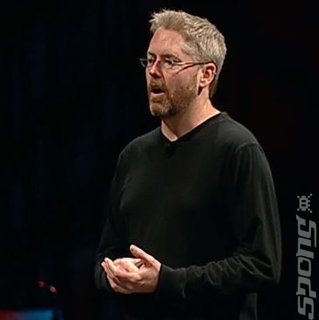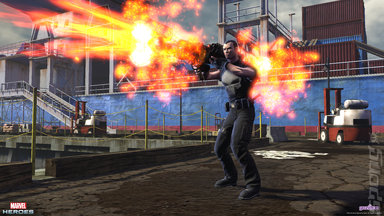As part of an ongoing series, SPOnG gets the unedited, open and highly informed opinions of developers, producers and more in the vast world of computer games.
Industry Figure: David Brevik
Job Title: President/COO
Company: Gazillion Entertainment
Best Known For: Diablo, Diablo II (at Blizzard North), Marvel Heroes (at Gazillion)
David Brevik is something of a legend in the PC industry. Having been the brains behind Diablo (and its sequel, Diablo II), the developer put the modern-day rogue-like adventure game on the map.
Now at Gazillion Entertainment, Brevik is taking all of the elements and sensibilities that made the Blizzard series successful and implementing it into Marvel Heroes, an MMO that lets players save the world as their favourite comic book star.
You can read more about the upcoming game right here in a previous interview with Brevik. Today, we ask the man about the state of the video game industry. Here's what he had to say.
Do you feel that an always-online future would be a positive one, for both developers and gamers?
Absolutely I do. In the not-too-distant future, people will be connected one way or another all the time anyhow. It is very rare already that people arenít connected in some way.
As computers and cell-phones merge and wifi pops up in ever increasing locations, including planes, there will be almost nowhere you can be and not be connected. The beauty of being connected is that you can play with your friends, or make new ones all the time. It brings people together.
Following Sony's PlayStation 4 reveal event, how successful do you think next-generation consoles will be in capturing the indie and mobile gamer?
It doesnít seem like they are catering to the indie or mobile game market in any way. That hasnít really been their traditional strong-point or audience. It seems like a smart decision to go after the audience they know is there, rather than take a huge risk and creating something that could push that audience away - ending up with a machine that caters to an audience that doesnít exist.
Do mobile gamers really want console machines? I see them as two very different audiences. As for indie gamers, they should have a special spot for that audience, but it isnít needed at launch. That is a feature that can wait. When you are creating a new piece of hardware, you have difficult choices to make and the reality is that the indie audience is small compared to others and that pushes features like that down the list.
They must the get the most important things correct and focus on what they do best. After that works, then they can broaden their audience with features that include new types of gaming.
How important is it to create new intellectual properties for existing platforms? Should the final years of a console generation consist of already-established franchises?
It is always important to create IP, regardless of platform life-cycles. IP is the king of the industry. If you have a popular product, you can ensure that greatly increases your odds of a successful launch of a new platform. If you have a popular product, you can lengthen the life-cycle of an older platform.
Also, there is no reason that the final years of a console could not open up new IPs that lead the way in the next generation of machines. With very popular franchises, there is never a bad time for a product.
Thanks to David for his time. Check out SPOnG's recent industry insights below.
Industry Insights Series:
Apr 2013: Andrew Smith, Spilt Milk Studios
Apr 2013: Antti Ilvessuo, RedLynx
Apr 2013: 'Peter Molydeux', Gaming Genius
Apr 2013: Paul Rustchynsky, Evolution Studios
Mar 2013: Gordon Midwood, Different Tuna
Mar 2013: Theo Sanders, Ubisoft Singapore
Mar 2013: Dan Webb, X360A
Mar 2013: Stewart Gilray, Just Add Water / Oddworld Inhabitants
Mar 2013: Alex Neuse, Gaijin Games
Feb 2013: Blazej Krakowiak, Techland
Feb 2013: Gina Jackson, Women in Games Jobs
Feb 2013: Stewart Gilray, Just Add Water & Oddworld Inhabitants
Feb 2013: Dominic Matthews, Ninja Theory
Jan 2013: Dan Webb, X360A
Jan 2013: Antti Ilvessuo, RedLynx
Jan 2013: Andy Payne, O.B.E.
Jan 2013: Gordon Midwood, Different Tuna
Jan 2013: Andrew Smith, Spilt Milk Studios
Jan 2013: Theo Sanders, Ubisoft Singapore
Jan 2013: Paul Rustchynsky, Evolution Studios
Jan 2013: Peter Molydeux, Genius
Jan 2013: Andy Payne O.B.E.
Jan 2013: David Jaffe
Jan 2013: Jon Lander of CCP
Dec 2012: Martyn Brown, InsightforHire
Dec 2012: Steve Lycett, SUMO Digital
Dec 2012: Theo Sanders, Ubisoft Singapore
Dec 2012: Ted Price, CEO Insomniac
Dec 2012: Paul Rustchynsky, Evolution Studios
Dec 2012: Antti Ilvessuo, RedLynx
Industry Figure: David Brevik
Job Title: President/COO
Company: Gazillion Entertainment
Best Known For: Diablo, Diablo II (at Blizzard North), Marvel Heroes (at Gazillion)
David Brevik is something of a legend in the PC industry. Having been the brains behind Diablo (and its sequel, Diablo II), the developer put the modern-day rogue-like adventure game on the map.
Now at Gazillion Entertainment, Brevik is taking all of the elements and sensibilities that made the Blizzard series successful and implementing it into Marvel Heroes, an MMO that lets players save the world as their favourite comic book star.
You can read more about the upcoming game right here in a previous interview with Brevik. Today, we ask the man about the state of the video game industry. Here's what he had to say.
Do you feel that an always-online future would be a positive one, for both developers and gamers?
Absolutely I do. In the not-too-distant future, people will be connected one way or another all the time anyhow. It is very rare already that people arenít connected in some way.
As computers and cell-phones merge and wifi pops up in ever increasing locations, including planes, there will be almost nowhere you can be and not be connected. The beauty of being connected is that you can play with your friends, or make new ones all the time. It brings people together.
Following Sony's PlayStation 4 reveal event, how successful do you think next-generation consoles will be in capturing the indie and mobile gamer?
It doesnít seem like they are catering to the indie or mobile game market in any way. That hasnít really been their traditional strong-point or audience. It seems like a smart decision to go after the audience they know is there, rather than take a huge risk and creating something that could push that audience away - ending up with a machine that caters to an audience that doesnít exist.
Do mobile gamers really want console machines? I see them as two very different audiences. As for indie gamers, they should have a special spot for that audience, but it isnít needed at launch. That is a feature that can wait. When you are creating a new piece of hardware, you have difficult choices to make and the reality is that the indie audience is small compared to others and that pushes features like that down the list.
They must the get the most important things correct and focus on what they do best. After that works, then they can broaden their audience with features that include new types of gaming.
How important is it to create new intellectual properties for existing platforms? Should the final years of a console generation consist of already-established franchises?
It is always important to create IP, regardless of platform life-cycles. IP is the king of the industry. If you have a popular product, you can ensure that greatly increases your odds of a successful launch of a new platform. If you have a popular product, you can lengthen the life-cycle of an older platform.
Also, there is no reason that the final years of a console could not open up new IPs that lead the way in the next generation of machines. With very popular franchises, there is never a bad time for a product.
Thanks to David for his time. Check out SPOnG's recent industry insights below.
Industry Insights Series:
Apr 2013: Andrew Smith, Spilt Milk Studios
Apr 2013: Antti Ilvessuo, RedLynx
Apr 2013: 'Peter Molydeux', Gaming Genius
Apr 2013: Paul Rustchynsky, Evolution Studios
Mar 2013: Gordon Midwood, Different Tuna
Mar 2013: Theo Sanders, Ubisoft Singapore
Mar 2013: Dan Webb, X360A
Mar 2013: Stewart Gilray, Just Add Water / Oddworld Inhabitants
Mar 2013: Alex Neuse, Gaijin Games
Feb 2013: Blazej Krakowiak, Techland
Feb 2013: Gina Jackson, Women in Games Jobs
Feb 2013: Stewart Gilray, Just Add Water & Oddworld Inhabitants
Feb 2013: Dominic Matthews, Ninja Theory
Jan 2013: Dan Webb, X360A
Jan 2013: Antti Ilvessuo, RedLynx
Jan 2013: Andy Payne, O.B.E.
Jan 2013: Gordon Midwood, Different Tuna
Jan 2013: Andrew Smith, Spilt Milk Studios
Jan 2013: Theo Sanders, Ubisoft Singapore
Jan 2013: Paul Rustchynsky, Evolution Studios
Jan 2013: Peter Molydeux, Genius
Jan 2013: Andy Payne O.B.E.
Jan 2013: David Jaffe
Jan 2013: Jon Lander of CCP
Dec 2012: Martyn Brown, InsightforHire
Dec 2012: Steve Lycett, SUMO Digital
Dec 2012: Theo Sanders, Ubisoft Singapore
Dec 2012: Ted Price, CEO Insomniac
Dec 2012: Paul Rustchynsky, Evolution Studios
Dec 2012: Antti Ilvessuo, RedLynx
Read More Like This
Comments
It's intriguiing how these 'insight' articles you publish are so completely and utterly self-serving that it pretty much makes them utterly useless on essentially any level.
(And that's pretty much across-the-board--all these guys act like their little corner of the gamingverse is the be-all, end-all, with Spong uttering nary a word of objection or inquisition...like a good little cog in the gaming PR machine.)
(And you guys wonder why laughable hideouts for nerds like Gaming Age don't take you seriously.)
(And that's pretty much across-the-board--all these guys act like their little corner of the gamingverse is the be-all, end-all, with Spong uttering nary a word of objection or inquisition...like a good little cog in the gaming PR machine.)
(And you guys wonder why laughable hideouts for nerds like Gaming Age don't take you seriously.)



